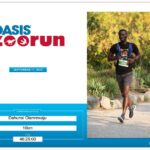In Fluent Forever: How to Learn Any Language Fast and Never Forget It, Language learning enthusiast Gabriel Wyner deconstructs the language learning process, revealing how to build a foreign language in your mind from the ground up. Wyner emphasized starting with pronunciation, rewiring your ears for the sounds of the new language while sharing strategies and resources such as spaced-repetition techniques, flashcards, online resources and other insights learned through his learned experience.
“There is no such thing as a “hard” language; any idiot can speak whatever language his parents spoke when he was a child. The real challenge lies in finding a path that conforms to the demands of a busy life.”
“Language learning is one of the most intensely personal journeys you can undertake. You are going into your own mind and altering the way you think. If you’re going to spend months or years working at that goal, you’ll need to believe in these methods and make them your own. If you know how to approach the language game, you can beat it.”
The Three basic keys to language learning:
1. Learn pronunciation first.
2. Don’t translate.
3. Use spaced repetition systems.
1. Learn pronunciation first.
The first key, learn pronunciation first, came out of my music conservatory training (and is widely used by the military and the missionaries of the Mormon church). Singers learn the pronunciation of languages first because we need to sing in these languages long before we have the time to learn them. In the course of mastering the sounds of a language, our ears become attuned to those sounds, making vocabulary acquisition, listening comprehension, and speaking come much more quickly. While we’re at it, we pick up a snazzy, accurate accent.
2. Don’t translate.
Not only can a beginning student skip translating, but it was an essential step in learning how to think in a foreign language. It made language learning possible. By throwing away English, I could spend my time building fluency instead of decoding sentences word by word.
3. Use spaced repetition systems.
The third key, use spaced repetition systems (SRSs), came from language blogs and software developers. SRSs are flash cards on steroids. Based upon your input, they create a custom study plan that drives information deep into your long-term memory. They supercharge memorization, and they have yet to reach mainstream use.
“English vocabulary is 28 percent French and 28 percent Latin.”
Exercise analogy
Think about exercise for a moment. To succeed in an exercise routine, we need to enjoy it or we’ll drop it.
- Successful gym rats learn to find the joy (and endorphins) in grueling daily workouts. The rest of us can push ourselves into the gym with willpower, but if we don’t find it enjoyable, we’re unlikely to continue for the six to twenty-four months we need to see results.
- As long as language learning is hard, we’ll run into the same problems. Who enjoys drilling grammar and memorizing word lists?
- We enjoy learning; it’s what addicts us to reading newspapers, books, and magazines and browsing websites like Life hacker, Facebook, Reddit, and the Huffington Post. Every time we see a new factoid.
Choose Your Language
- Choose a language based upon employment opportunities, difficulty, availability of resources, or number of speakers, but in the end, choose a language that you like.
- Never settle for safe when you can have fun instead. Your language will become a constant companion, living in your head. If you like your language, then you’ll have fun studying it, and when you have fun, you learn faster.
“The world’s languages contain roughly 800 phonemes (six hundred consonants and two hundred vowels). Most languages choose around 40 of these to form their words,”
Pitfalls to avoid
- First, avoid books systematically detailing every single solitary rule and detail and exception, all at once, in an uncontrollable torrent of grammatical despair.
- Second, be wary of most classroom books, especially those without an answer key. Books designed for classrooms are often sparse on explanations, because they expect that the teacher will be able to handle any confusion. You’ll often have more luck with a self-study book.
“Levels of Processing: The Great Mnemonic Filter”
Four types of connections: structure, sound, concept, and personal connection.
These are the four levels of processing. They were identified in the 1970s by psychologists who created a curious questionnaire with four types of questions and gave it to college students:
- Structure: How many capital letters are in the word BEAR?
- Sound: Does APPLE rhyme with Snapple?
- Concept: Is TOOL another word for “instrument”?
- Personal Connection: Do you like PIZZA
The four levels of processing are more than a biological quirk; they act as a filter, protecting us from information overload. We live in a sea of information, surrounded by a dizzying amount of input from TV, the Internet, books, social interactions, and the events of our lives.
Your brain uses levels of processing to judge which input is important and which should be thrown out.
Pattern Matching: How to Remember a Foreign Word Forever
Structure
The shallowest level, structure, allows you to recognize patterns of letters and determine whether a word is long, short, and written in English or in Japanese. Your brain is recognizing structure when you unscramble odctor into doctor. This level is essential for reading, but it involves too little of your brain to contribute much to memory.
“Your first task in language learning is to reach the next level: sound.”
Sound
Sound connects structure to your ears and your mouth and allows you to speak. You’ll start by learning the sounds of your language and which letters make those sounds, because if you begin with sound, you’ll have a much easier time remembering words.
“Sound is the land of rote memorization.”
Concepts
Concepts can be broken down into two groups: abstract and concrete.
We prioritize and store concrete concepts because they engage more of our brains, not because they’re necessarily any more important than other information.
We are not bad at remembering words when they are tied to concrete, multisensory experiences.
We have no problem naming things; nouns comprise the vast majority of the 450,000 entries in Webster’s Third International Dictionary. It’s when those names aren’t tied to concrete concepts that we run into trouble with our memories.
We recall images much better than words, because we automatically think conceptually when we see an image.
Get These
A Phrase Book
A frequency dictionary typically contains the most important five thousand words of your target language, arranged in order of frequency.”
A pronunciation guide
A pronunciation guide will walk you through the entire pronunciation system of your language, with the help of recordings and diagrams of your mouth and tongue
Find two dictionaries
- The first is a traditional bilingual dictionary (e.g., English-French/French-English), with accurate pronunciation listed for every word.
- The second is a monolingual dictionary (e.g., French-French), which has actual definitions (e.g., in French) rather than translations.
Thematic vocabulary book
- These books arrange the words in your language by theme: words about cars, words for food, medical words, and so on. They’re handy for customizing your vocabulary.
All the best in your quest to get better. Don’t Settle: Live with Passion.



Comments are closed.